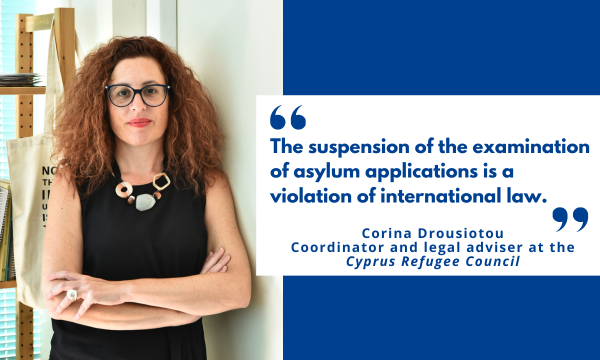« The suspension of the examination of asylum applications is a violation of international law »
Corina Drousiotou, coordinator and legal adviser at the Cyprus Refugee Council - Published on 27 June 2024Version FrançaiseCorina Drousiotou, coordinatrice et conseillère juridique au Cyprus Refugee Council, nous éclaire sur la situation à Chypre et les conséquences des récentes mesures gouvernementales pour les personnes en demande d’asile.
Depuis le début de l'année 2024, Chypre a vu augmenter le nombre de personnes migrantes arrivant sur son territoire, notamment de personnes exilées syriennes fuyant la guerre. Comment le gouvernement chypriote a-t-il réagi face à cette situation ?
Le nombre d'arrivées de personnes migrantes a en réalité atteint un pic en 2022. En 2023, le nombre d'arrivées était inférieur de moitié à celui de 2022, et en 2024 les chiffres étaient similaires à ceux de 2023. Le nombre d'arrivées en février est, de fait, inférieur à celui de l'année dernière.
Ce qui a changé, c'est le pays d'origine et le mode d'arrivée. Traditionnellement, les personnes réfugiées arrivaient par la partie nord de l'île, pour 90 % d'entre elles. Au début de l'année 2024, pour la première fois, la plupart des personnes sont arrivées par bateau, directement sur les côtes au sud. Ces arrivées sont plus visibles publiquement. Un autre changement dont nous avons été témoins est la diminution du nombre de personnes en provenance de pays africains l'année dernière.
En réponse à l'augmentation des arrivées par bateau, le gouvernement a réagi en prenant des mesures. Toutefois ces mesures ont été prises sans grande consultation ni préparation. Plutôt que des mesures réfléchies, elles semblent être des mouvements de panique, probablement adoptées à la hâte en raison des élections locales et européennes qui approchaient.
Quelles sont les mesures du gouvernement qui mettent en difficultés les demandeurs d’asile syriens à Chypre ?
Face à ces arrivées, le gouvernement a annoncé des mesures visant uniquement les personnes syriennes, notamment la suspension de l'examen de leurs demandes d'asile.
Cette mesure avait déjà été appliquée sous le précédent gouvernement. Elle n'avait pas été déclarée publiquement mais était flagrante au vu des statistiques. Nous avons donc désormais des personnes qui attendent l'examen de leur demande depuis bien plus de 21 mois, délai maximum autorisé par la directive européenne [relative à des procédures communes pour l'octroi et le retrait de la protection internationale]. Certaines personnes attendent depuis trois ans.
Une autre mesure a été prise par le gouvernement actuel : les personnes syriennes en demande d’asile auront le choix de rester dans les centres d'accueil ou de les quitter, mais si elles partent, elles perdront le bénéfice des conditions matérielles d'accueil, qui comprennent une allocation de logement et de subsistance, et ne recevront aucune aide publique.
A cela s’ajoute une décision prise à la fin de l'année 2023, l'extension de la période d'attente pour obtenir l'autorisation de travailler, qui passe d'un mois après le dépôt de la demande d'asile à neuf mois. Ces mesures auront un impact important sur la communauté syrienne, qui a réussi à s'intégrer efficacement dans le monde du travail, et la laisseront dans une situation difficile.
Quels problèmes les décisions du gouvernement posent-elles au regard du droit international ?
La suspension de l'examen des demandes d'asile est une violation du droit international car elle empêche l'accès à la protection internationale. Elle enfreint le droit d'asile, inscrit dans la Charte des droits fondamentaux de l'Union européenne (UE).
Chypre a également demandé à l'UE de réévaluer la situation en Syrie et souhaite que le pays, ou certaines de ses régions, soit reconnu comme un lieu sûr. Pourtant, aucune décision multilatérale considérant la Syrie comme un lieu sûr n’a été prise à ce jour, et il n'appartient pas à Chypre seule de décider si la Syrie peut être considérée comme un pays sûr, et de suspendre l'examen des demandes d'asile.
La question des refoulements est également au cœur du problème. En un jour, le gouvernement chypriote a repoussé cinq bateaux en provenance de Syrie ou du Liban. Il s'agit là aussi d'une violation du droit international.
Quel effet pensez-vous que ces mesures auront sur les arrivées des personnes qui cherchent l'asile ?
Il y a eu une diminution des arrivées, car aucun bateau n'est arrivé depuis. Mais nous verrons si cette tendance se poursuit. Nous nous attendons à ce que les routes d'arrivée se concentrent à nouveau dans les régions du nord de l'île.
Les mesures qui limitent la possibilité pour les personnes en demande d’asile de travailler et de s'intégrer ont également engendré de l’inquiétude au sein de ces communautés.
Que fait le Cyprus Refugee Council pour répondre à cette situation ?
Nous préparons des actions de contentieux stratégique, en particulier sur la suspension de l'examen des demandes d'asile, mais aussi sur la limitation des conditions d'accueil.
Il y a beaucoup de débats sur la question de savoir si le pays peut gérer ces arrivées, mais compte tenu des besoins réels du pays en matière de travail, le gouvernement devrait trouver des solutions qui soient bénéfiques pour les deux communautés.

Just a few kilometres from Lebanon and Syria, Cyprus has seen an increase in the number of Syrian exiles arriving by boat directly on its coasts in recent months. In spite of a stable total number of asylum seekers, the Cypriot government reacted to these more visible arrivals by announcing tougher reception conditions for asylum seekers in the country.
Corina Drousiotou, coordinator and legal adviser at the Cyprus Refugee Council, sheds light on the situation in Cyprus and the impact of recent government measures on asylum seekers.
Since the beginning of 2024, Cyprus has seen an increase in the number of migrants arriving on its territory, particularly Syrian exiles fleeing the war. How has the Cypriot government responded to this situation?
The high numbers in arrivals of migrants actually peaked in 2022. In 2023 the number of arrivals were half of those in 2022, and in 2024 the numbers were similar to 2023. The number of arrivals in February was actually lower compared to last year.
What has actually changed is the country of origin and the mode of arrival. Traditionally, refugees have arrived through areas in the north of the island: this was originally the case for 90% of them. What happened in the beginning of 2024 is that for the first time, most people were coming by boat, directly on the coast. These arrivals are more visible to the public. Another change that we witnessed is a decrease of people coming from African countries last year.
In response to the increase in arrivals by boat, the government has taken action. But these measures were taken without much consultation or preparation. Rather than considered measures, they appear to be panic moves, probably rushed into adoption because of the upcoming local and European elections.
What government measures are currently causing difficulties for Syrian asylum seekers in Cyprus?
In the face of these arrivals, the government announced measures targeted only to Syrian asylum seekers. It includes the suspension of the examination of their asylum applications.
Under the previous government, such a measure had already been taken. It was not publicly declared but was obvious looking at the statistics. As a result of this past measure, we now have people who have been waiting for the examination of their application for well over 21 months, which is the maximum time authorised by the EU directive [on common procedures for granting and withdrawing international protection]. Some people have been waiting for three years.
Another measure that has been taken is that Syrian asylum seekers will be given the choice of either staying in reception centres or leaving them, but if they leave, which include a rental and subsistence allowance, and will not receive any help.
A previous measure that was taken at the end of 2023 is the extension of the waiting period for the right to work, from one month after applying for asylum to nine months. These measures will have a big impact on the Syrian community, which has a successful record of effectively integrating into the work force, leaving them in a difficult situation.
What problems do the government’s decisions pose in light of international law?
The suspension of the examination of asylum applications is a violation of international law as it prevents access to international protection. It violates the right to asylum, enshrined in the Charter of Fundamental Rights of the European Union (EU).
Cyprus has also called on the EU to reassess the situation in Syria, and wants the country, or some of its regions, to be recognised as a safe place. But there has been no decision considering Syria a safe place yet. Such a decision was not taken multilaterally, and it is not up to Cyprus alone to decide whether Syria can be considered a safe country or not, and to suspend the examination of asylum applications.
Moreover, there is the question of pushbacks. The Cyprus government in one day pushed back 5 boats, arriving either from Syria or Lebanon. This is also a violation of international law.
What effect do you think these measures will have on the arrivals of people seeking asylum?
There was a drop in arrivals, as no boats have arrived since then. But we will see if this will continue. We expect the route of arrival to come back to the areas in the north of the island.
These measures limit the possibility of asylum seekers to work, to integrate, so it has created unrest among these communities.
What is the Cyprus Refugee Council doing to address this situation?
On this situation, we are planning strategic litigation, especially on the suspension of the examination of asylum applications, but also on the limitation of the reception conditions.
There is a lot of discussions on whether the country can put up with the arrivals, but in view of the actual needs of the country for people to work, the government should find solutions that would be beneficial for both communities.
